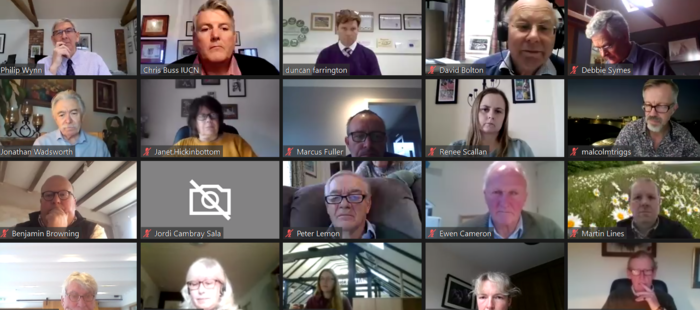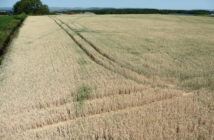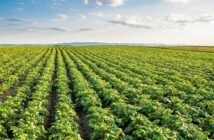The industry came together remotely in November to discuss the climate emergency and what could be done about it. John Swire went along.
We are facing a crisis of huge proportions in the form of a climate emergency. Rising CO2 emissions are contributing to heating up the atmosphere which is starting to cause problems around the globe. For far too long this has been a problem facing scientists and special interest lobby groups. However, reality is beginning to bite and at last governments, industry and the general population are all beginning to take note of the problems affecting us all.
World leaders committed to a historic agreement to tackle climate change in 2015 Paris conference. They agreed to hold the increase in the global average temperature to well below 2oC above pre-industrial levels and to pursue efforts to limit the rise to 1.5oC. They also agreed to step up efforts to adapt to the impacts of climate change and make finance flows consistent with a pathway towards low greenhouse gas emissions and climate resilient development. The UN Climate Change Conference held here in the UK is an ideal time to have a reality check and to see if these aims are to be met.
If they are to be met, then agriculture will have to play an important role and the industry is now beginning to realise that it can lead the way and set an example to others in the years to come. So, how can we as industry make our own contribution? On 20th of November leading thinkers from the food and farming industries came together at the LEAF (Linking Environment And Farming) conference to debate the Climate Change Emergency ahead of COP26 next year. Whilst there was collective agreement that there are significant challenges ahead, the UK was named as a possible beacon for the rest of the world in tackling change, due to the level of positive action already being taken and the results achieved so far.
Lead climate change specialist at The World Bank, Jonathan Wadsworth, opened the conference by saying that the biggest threat from climate change would be the reversal of decades of positive development achievement. The millennium development aims of 2000 to 2015 saw great progress across the world, but as climate change affects poorer regions more, then all these achievements could be lost. He went on to suggest that the UK is set to play a major role in the movement for change at an international level. In particular, through pioneering new approaches to rewarding farmers for the delivery of environmental goods and services through the ELM (Environmental Land Management) scheme.
Caroline Drummond, LEAF chief executive, added: “Whilst many aspects of our lives have been disrupted in 2020 with COVID-19, and in the UK with Brexit, climate change has continued relentlessly. Never before has it been so clear that we need to take action that is long-term, inclusive and creates change to tackle the climate crisis and achieve stability in our environment around Net Carbon Zero and sustainable development.
“Much has already been achieved by the farming and food sector, through sustainable farming methods like Integrated Farm Management. Over the next 10 years, however, we need to scale up that work in order to deliver against the requirements of the Paris agreement and of course the Sustainable Development Goals. We must set into action activities and commitment from farmers, as we move out of Europe that will strengthen the positioning of agriculture as a solution to some of the huge climate change challenges through carbon sequestration, better soil and water management, boosting biodiversity, reducing waste and minimising energy use.”
Mr Wadsworth added: “The UK government is already setting a precedent by its repurposing of farm subsidies into payments for environmental services. However, in order for us to see a wider movement for change, farmers and researchers across the world must work together towards more climate smart solutions. If we are to have any hope of meeting the Sustainable Development Goals by 2030, we must adapt quickly to climate change and reduce emissions urgently. We must take action now.”
Minette Batters, president, National Farmers Union, reinforced the importance of 2021 as a vital year of climate action: “With severe weather events already impacting farming, this is a critical time for the agriculture industry. That is why the NFU has set the ambitious goal of reaching net zero greenhouse gas (GHG) emissions across the whole of agriculture in England and Wales by 2040. COP26 represents the most important round of climate change discussions to date. Therefore, 2021 could be a game changer not just for the UK, but for the rest of the world.”
The conference also highlighted some of the tactics that could be used to tackle climate change and the important role farmers can play. Chris Buss, Deputy Director of the International Union for Conservation of Nature (IUCN) Global Forest and Climate Change Programme, explained: “Farmers are a key delivery mechanism to address climate change solutions. Nature-based solutions and land use can both play a combative role. Planting trees on farmland can only help improve soil fertility and bring nutrients into farming systems, help regulate water, provide building materials and firewood. This is just one of the ways agriculture can tackle climate change, which is why allowing farmers to help make and shape policy is the key to success, especially in the lead up to COP26.”
LEAF Marque certified farmer and LEAF Demonstration Farmer, Duncan Farrington from Farrington Oils, was the first producer to go carbon and plastic neutral, making him a pioneer in sustainable farming. He explained some of the methods he uses: “It is by making small changes that you can make a big impact in reducing carbon emissions. One of the ways we do this is by offsetting energy usage across the farm with reforestation and green energy initiatives.
“Our biggest gain has been in soil health with a 75% increase in soil organic matter and in absorption of an extra 300 tonnes of carbon dioxide by one single field every year. Sustainable soil management has had a huge impact on climate change. There is a lot more that farmers can do, especially considering consumers increasing appetite for climate-friendly food production.”
During the conference, which was chaired by BBC broadcaster Tom Heap, LEAF also unveiled its 10-year strategy, with a strong focus on transforming farming and food systems. Building on LEAF’s core work to support the delivery of Positive Action for Climate, Nature, Economy and Society, based on Integrated Farm Management and the principles of Circular Agriculture.
Climate change: The facts
The worst impacts of climate change could be irreversible by 2030
In its 2018 special report on Global Warming of 1.5o the United Nations Intergovernmental Panel on Climate Change (IPCC) warned that we only have twelve years to prevent the worst impacts of climate change.
The 20 warmest years on record have been in the past 22 years
The World Meteorological Organization (WMO) has compounded the research released in the 2018 IPCC report, stating that 20 of the warmest years on record have occurred since 1996
More than 1 million species are at risk of extinction by climate change
Scientists estimate dozens of species of plants and animals currently go extinct each day —nearly 1,000 times the natural rate. By mid-century, as many as 30 to 50 percent of the total species found on Earth will have disappeared.




